
Internal Medicine
The Heart
Whether a heart murmur or a rhythm disturbance is present, and whether this may need further investigation, can be clarified in the course of a cardiovascular examination.
Blood gas analysis can be used to determine whether the heart is adequately supplying the circulatory system with oxygen or whether there is a possible heart problem.
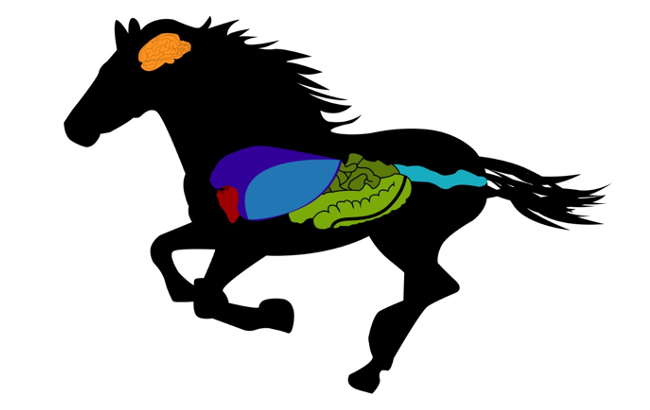
The heart ensures that blood is pumped into the circulation and that all organs are sufficiently supplied with oxygen and nutrients.
Heart murmurs are relatively common in horses and indicate that one of the heart valves is not closing properly. A cardiac ultrasound is necessary to clarify whether the murmur is unproblematic (innocent) or whether it can cause clinical problems.
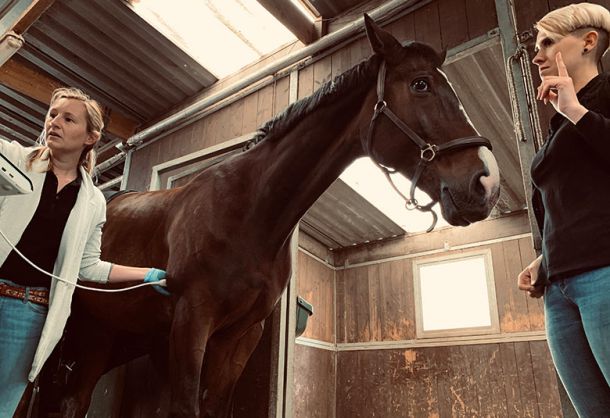
The Lung
Whether there is enough oxygen in the blood also depends on lung function.
This can be investigated by blood gas analysis.
There are many different reasons for impaired lung function. One of the most common causes is equine asthma, formerly also known as COPD / COB / RAO. A bronchoscopy is often necessary to confirm the diagnosis of lower airway disease.
With our wireless endoscopes, endoscopies of the respiratory tract can be performed in the stable.
Frequent diseases and disorders of the upper respiratory tract originate in the guttural pouch (e.g. strangles) or the larynx (e.g. laryngeal hemiplegia). These can also be visualized by endoscopic examination.
Many diseases of the lung tissue (e.g. abscesses, tumors, fibroses, effusions) can be detected by ultrasound examination. Ultrasound guided lung tissue sampling can also be performed as further diagnostic.
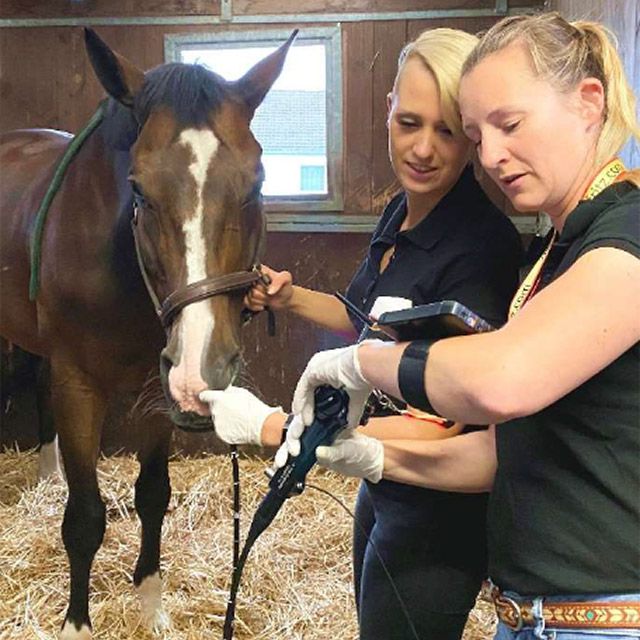
Digestive Tract
Teeth
The horse’s digestion begins with chewing. Dental findings often play an important role in cases of weight loss or other symptoms.
Therefore, thorough oral cavity examination with, if necessary, subsequent dental treatment are often the beginning of further investigation of digestive problems.
Stomach
Horses are prone to stomach ulcers. Depending on which mucosa the ulcers are located on, cause and therapy are different.
A gastroscopy (endoscopy of the stomach) shows whether and where there are abnormal changes and whether and which therapy is necessary. Thanks to our wireless endoscopes and our experienced team, we can offer you this examination on site.
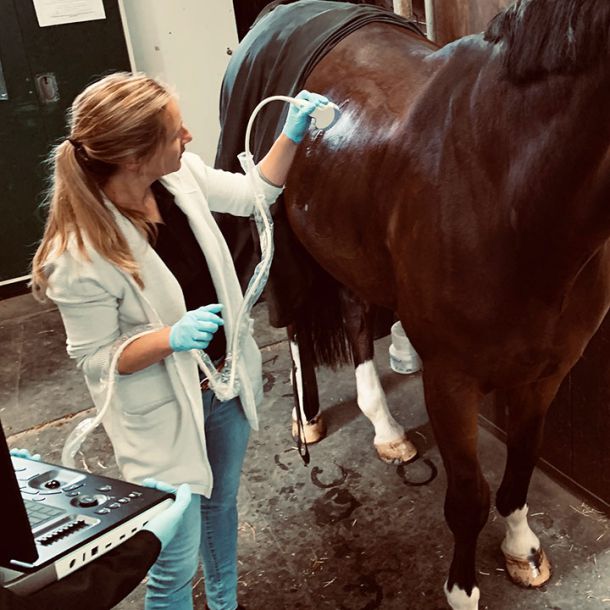
Intestines, Liver
Intestinal and liver diseases such as recurrent colic or weight loss are also relatively common in horses.
In order to get to the bottom of the cause, various examinations such as blood tests, ultrasound of the abdominal cavity, absorption tests, abdominocentesis or biopsies (rectal mucosa biopsy, liver biopsy) are available, which can all be performed at the stable.
Nervous system
Diseases that affect the nervous system can manifest themselves in changes in consciousness, behavior and / or gait.
The most feared infectious diseases are probably equine herpes myeloencephalopathy, tetanus or botulism. But non-infectious diseases such as “wobblers” also belong to the category of neurologic diseases.
The affected region of the nervous system can be localized with a detailed neurological examination. Further laboratory tests often provide information about the disease itself and are essential in the face of infectious events and outbreaks.
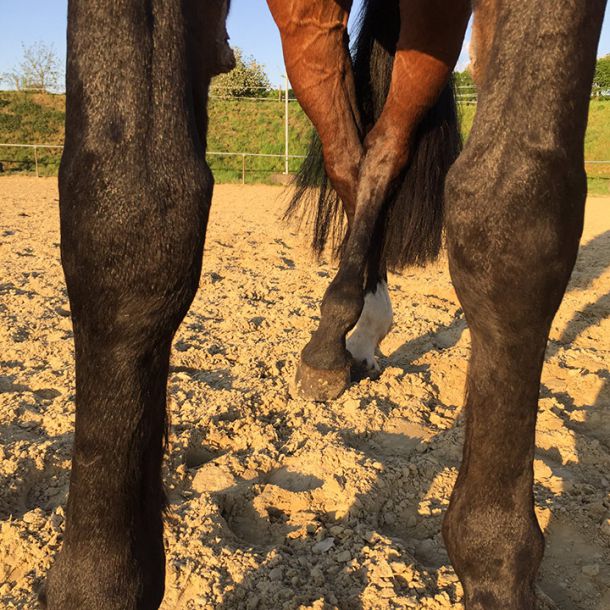
Urogenital Tract
(Kidneys, bladder, reproductive organs)
Urine is produced by the kidneys, enters the bladder through the ureters, and is then excreted through the urethra.
When the kidneys stop working properly, it is called renal insufficiency. This can for example be caused by decreased blood flow, infection or medication.
Bladder stones can form in the bladder, which can lead to inflammation, impeded passage of urine or even symptoms of poor performance. There are other causes of inflammation of the bladder, such as bacterial infection or tumors.
If irregularities in urination are observed (reduced or increased volume, dripping or discoloration), an examination should be carried out. This can be a blood or urine test, an ultrasound examination of the kidneys, or an endoscopy of the bladder (cystoscopy).
Musculature
For decades, riders have known about “tying up”. Research over the past few years has taught us that there are a multitude of different muscle disorders, with different causes, and requiring different therapies and management. PSSM, the Polysaccharide Storage Myopathy, is one of them.
Blood tests, genetic tests, or muscle biopsies can help clarify such diseases.
Skin
The skin is the body’s largest organ and is the target for a wide variety of diseases. Many horses suffer from skin parasites, pastern dermatitis, allergies (e.g. culicoides allergy) or tumors (e.g. sarcoids or melanomas).
For diagnostics, intracutaneous allergy testing (similar to prick test), skin scrapings and biopsies, among other things, are available. The intracutaneous skin test is still considered the golden standard in identifying relevant allergens, but serum tests can also be very helpful and together they form the basis for therapy and patient management.
Here as well we are happy to help and guide you with diagnostics, therapy and management.

Endocrine and Metabolic Diseases
This includes hormonal and metabolic disorders. These include for example Equine Cushing, thyroid disease, hormonally active ovarian tumors, and the Equine Metabolic Syndrome (EMS).
A variety of static and dynamic tests are available for diagnostics, where it is important to select the “right” one in order to be able to adapt management and therapy.
Own Laboratory
With our mobile laboratory equipment, many examinations can be carried out on site without having to wait long for results. If necessary, further diagnostics can be initiated immediately and further appointments can be avoided.
Possible on-site diagnostics include:
- Blood tests (hematology, serum biochemistry / organ profile)
- Examination of abdominal or thoracic fluid
- Urine tests
- Blood gases
- Heart marker (cardiac troponin)